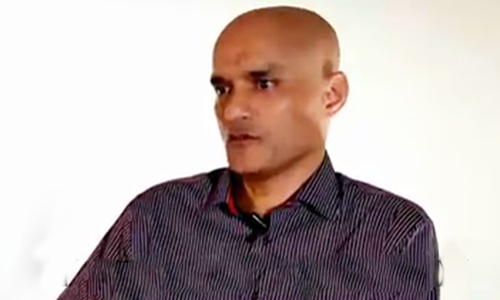ISLAMABAD: India on Thursday appeared uninterested in securing relief for its spy from Pakistani courts, which resulted in a deadlock over the appointment of a defence lawyer for Kulbhushan Jadhav to plead his case before the Islamabad High Court (IHC).
An IHC larger bench, comprising Chief Justice Athar Minallah, Justice Aamer Farooq and Justice Miangul Hassan Aurangzeb, took up the petition filed by the Ministry of Law and Justice seeking appointment of defence counsel for Jadhav for review of his conviction in compliance with the order of the International Court of Justice (ICJ).
The bench observed that the judicial review in the Jadhav case would be a futile exercise if the Indian spy would not actively participate in the proceedings, adding that protecting rights of Commander Jadhav was of paramount importance for the court.
Attorney General for Pakistan (AGP) Khalid Jawed Khan informed court that pursuant to its order of Aug 3, the Pakistani government had formally approached the Indian Ministry for External Affairs and also contacted Jadhav over appointment of his defence counsel.
However, he said, both of them appeared to be not interested in pursuing the case in the IHC, apparently to raise the issue in the international community and to make it an excuse to knock the ICJ door again.
Delhi seems uninterested in seeking relief for Jadhav from Pakistani courts
According to the AGP, in a note verbale the Indian government initially intimated that it has engaged a Pakistani lawyer, Shahnawaz Noon, however, it did not give him any paper of power of attorney. Citing some media reports, he said the Indian government had been quoted as saying it would engage a lawyer from outside Pakistan but under Pakistani law such a lawyer was not allowed to argue in a court of the country.
Mr Khan said Pakistani officials had met Jadhav in compliance with the IHC directive and gave him a briefing, particularly regarding his right to avail the statutory remedy provided under the International Court of Justice (Review and Reconsideration) Ordinance, 2020, which had been promulgated to comply with the ICJ order.
Jadhav was also informed regarding the judgement of the ICJ and his rights under Article 36 of the Vienna Convention on Consular Relations, the AG said.
According to him, Jadhav has been informed by the officials of the government of Pakistan that he has reiterated his earlier stance and has preferred to pursue the remedy of clemency, instead of invoking his right under the ordinance of 2020. The AGP said the Indian government was duly informed regarding the proceedings of the IHC on Aug 3, but the latter’s response was awaited.
The court asked its registrar whether a lawyer had filed a power of attorney on behalf of the Indian government and the response was in the negative.
The bench noted that the government of Pakistan, to meet its obligations regarding giving effect to the judgement of the ICJ pronounced on July 17, 2019, had specifically promulgated the ordinance of 2020.
“The proceedings before us are aimed at ensuring that the judgement of the international court is given effect. We are mindful of the emphasis laid down by the international court, in its judgement, relating to the need for the review and reconsideration to be effective. We are of the opinion that these proceedings and judicial review, on the basis of the judgement of the international court, may not be meaningful and effective if Commander Jadhav and the government of India decide not to exercise the course of action highlighted in the judgement of the international court,” the court observed.
“Protecting the right to a fair trial of Commander Jadhav is of paramount importance to ensure that the review and reconsideration is not only effective but is also seen to be such. We have no reason to doubt, as stated by the learned attorney general, that the officials of the government of Pakistan have complied with our direction by informing Commander Jadhav regarding his right to a fair trial and his rights under Article 36 of the Convention,” the court said.
“It is unquestionable that the right to a fair trial is the foundation of the rule of law and our criminal justice system. The essence of fair trial is to assure to every party that he or she would be treated fairly and justly by a judicial forum, which is impartial and independent. In the case in hand, Commander Jadhav is the most crucial stakeholder followed by the government of India,” the court observed.
“The judgement of the international court does not contemplate proceedings for review and reconsideration if Commander Jadhav and/or the government of India are not inclined or willing to avail the remedy specifically provided through the enactment of the ordinance of 2020.
“It appears to us that the effectiveness of these proceedings are dependent on the willingness of Commander Jadhav and the government of India to avail the statutory remedy provided under the ordinance of 2020,” the bench observed.
It added: “If both choose to distance themselves from these proceedings, then questions would arise regarding the validity of the petition filed by the government of Pakistan under the ordinance of 2020 and the status of compliance with the judgement of the international court. The choice of means was left to be decided by the government of Pakistan and the latter, in compliance, has enacted the ordinance of 2020.”
The court noted that obligation of the government of Pakistan, prima-facie, appeared to be confined to “providing” effective review and reconsideration. It questioned what if Jadhav, exercising free will, or the government of India decided not to pursue the statutory remedy provided for review and reconsideration? What then would be the status of compliance with the judgement of the ICJ?
Subsequently, the bench with the consent of the attorney general adjourned the hearing till Oct 6 to fulfill the requirements of a fair trial.
The court directed the attorney general to ensure delivery of the order sheet to Jadhav. It directed the government of Pakistan to again convey the orders passed in this petition to the government of India to enable the latter to consider taking appropriate measures to ensure compliance with the judgement of the ICJ.
Published in Dawn, September 4th, 2020














































